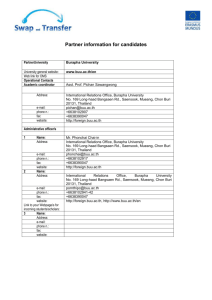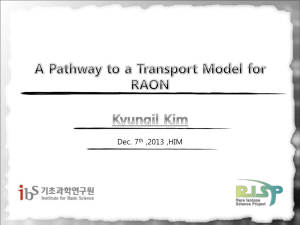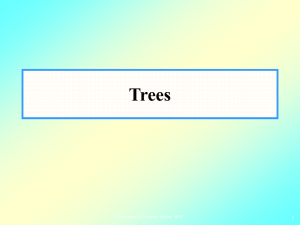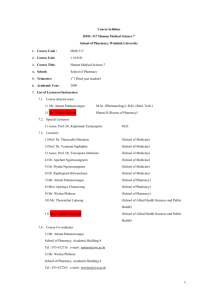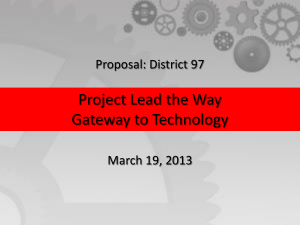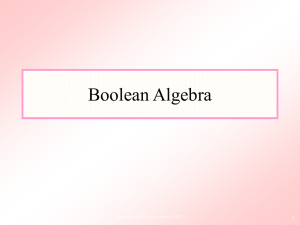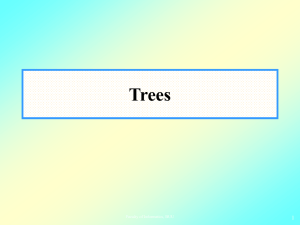MIT-6 - It works
advertisement
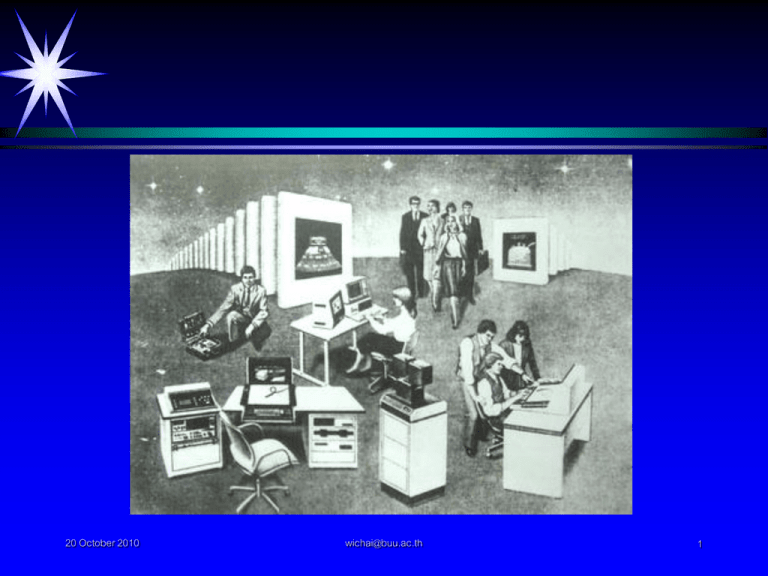
20 October 2010 wichai@buu.ac.th 1 321450 Management of Information Technology Chapter 6 IT Infrastructure and Platforms Asst. Prof. Wichai Bunchua E-mail : wichai@buu.ac.th http://www.informatics.buu.ac.th/~wichai IT Infrastructure and business capabilities 20 October 2010 wichai@buu.ac.th 3 IT Infrastructure and business capabilities The services a firm is capable of providing to its customers, suppliers, and employees are a direct function of its infrastructure This infrastructure should support the firm’s information systems strategy New information technologies have a powerful impact on business and IT strategies, as well as the services that can be provided to customers 20 October 2010 wichai@buu.ac.th 4 IT Infrastructure? What is IT Infrastructure? IT Infrastructure is the shared technology resources that provided the platform for the firm’s specification information system applications IT Infrastructure includes hardware, software, and services that are shared across the entire firm 20 October 2010 wichai@buu.ac.th 5 IT Infrastructure? IT Infrastructure is a set of firmwide services budgeted by management and comprising both human and technical capabilities These services include Computing platforms Telecommunication services Data management services (cont.) 20 October 2010 wichai@buu.ac.th 6 IT Infrastructure? (cont.) Data management services Application software services Physical facilities management services IT management services IT standard services IT education services IT research and development services 20 October 2010 wichai@buu.ac.th 7 Levels of IT Infrastructure Firm infrastructure is organized at 3 major levels Public Enterprise Business There may be other low levels Departments Individual employees 20 October 2010 wichai@buu.ac.th 8 Levels of IT Infrastructure 20 October 2010 wichai@buu.ac.th 9 Evolution of IT Infrastructure: 1950The IT infrastructure in organizations today is an outgrowth of over 50 years of evolution in computing platforms We identified five stages in this evolution, each representing a different configuration of computing power and infrastructure elements 20 October 2010 wichai@buu.ac.th 10 Evolution of IT Infrastructure: 1950The five eras are Automated special-purpose machines General-purpose mainframe and minicomputer computing Personal computers Client/server networks Enterprise and Internet computing 20 October 2010 wichai@buu.ac.th 11 Evolution of IT Infrastructure: 1950Electronic Accounting Machine Era: 1930-1950 Sort computer cards into bins, accumulate totals, and print reports. Large and cumbersome Programs were hardwired into circuit boards No programmers Human machine operators are operating system, controlling all system resources. 20 October 2010 wichai@buu.ac.th 12 Evolution of IT Infrastructure: 1950General-purpose mainframe and minicomputer Era: 1959 to present UNIVAC - first commercial all-electronic vacuum tube computer in 1950s IBM 1401 and 7090 transistorized machines named mainframe in 1959 IBM 360 series - first commercial computer with powerful operating system providing time sharing, multitasking, and virtual memory in 1965 (cont.) 20 October 2010 wichai@buu.ac.th 13 Evolution of IT Infrastructure: 1950General-purpose mainframe and minicomputer Era: 1959 to present (cont.) Today IBM mainframe can work with a wide variety of different manufacturers’ computers and multiple OS on client/server networks and Internet technology standard DEC introduced minicomputer PDP-11 in 1965 and later VAX machines - powerful machines at far lower prices than IBM mainframes 20 October 2010 wichai@buu.ac.th 14 Evolution of IT Infrastructure: 1950Fig 6-3 a 20 October 2010 wichai@buu.ac.th 15 Evolution of IT Infrastructure: 1950Personal Computer Era: 1981 to present First truly personal computer MIT’s Altair, and Apple I and II appeared in 1970s IBM PC in 1981 credited as beginning of PC era because it was widely adopted in American businesses First using DOS operating system, later Microsoft Windows Wintel PC computer became the standard desktop personal computer 20 October 2010 wichai@buu.ac.th 16 Evolution of IT Infrastructure: 1950Personal Computer Era: 1981 to present (cont.) Today, 95% of world’s estimated 1 billion computers used Wintel standard Since 1981, PC software productivity as word processors, spreadsheet, presentation and small data management were valuable to both home and corporate users These PCs were standalone until PC operating system made it possible to link into networks 20 October 2010 wichai@buu.ac.th 17 Evolution of IT Infrastructure: 1950Client/server Era: 1983 to present In client/server computing, desktop or laptop called clients are networked to server that provided the client with a variety of services and capabilities A client is the user point of entry, server provides communication among the clients, processes and stores shared data, serves up Web pages, or manages network activities 20 October 2010 wichai@buu.ac.th 18 Evolution of IT Infrastructure: 1950- 20 October 2010 wichai@buu.ac.th 19 Evolution of IT Infrastructure: 1950Client/server Era: 1983 to present (cont.) The term server refers to both the software application and the physical computer on which the network software runs The server could be a mainframe or PC often using multiple processors 20 October 2010 wichai@buu.ac.th 20 Evolution of IT Infrastructure: 1950Client/server Era: 1983 to present (cont.) Simple client/server architecture - two tiered Multitiered or N-tier Novell Netware was the leading technology at the beginning Today Microsoft Windows Server controls 78% of LAN market 20 October 2010 wichai@buu.ac.th 21 Evolution of IT Infrastructure: 1950Fig 6-4 20 October 2010 wichai@buu.ac.th 22 Evolution of IT Infrastructure: 1950Enterprise Internet Era: 1992 to present In early 1990s, firms turned to networking standards and software tools and could integrate disparate networks into an enterprise infrastructure In 1995 Internet was developed using TCP/IP IT infrastructure links different types and brands of hardware and small networks into enterprise-wide network 20 October 2010 wichai@buu.ac.th 23 Evolution of IT Infrastructure: 1950Fig 6-3 c 20 October 2010 wichai@buu.ac.th 24 Evolution of IT Infrastructure: 1950Enterprise Internet Era: 1992 to present (cont.) IT infrastructure links different types and brands of hardware and small networks into enterprise-wide network Enterprise networks link mainframes, servers, PCs, mobile phones, and other handheld devices, and connect to public infrastructures such as the telephone system, the Internet and public network services. 20 October 2010 wichai@buu.ac.th 25 Evolution of IT Infrastructure: 1950Table 6-1a 20 October 2010 wichai@buu.ac.th 26 Evolution of IT Infrastructure: 1950Table 6-1b 20 October 2010 wichai@buu.ac.th 27 Technology Drivers of Infrastructure Evolution The changes in IT infrastructure have resulted from developments in Computer processing and memory chips Storage devices Telecommunications and networking hardware and software Software design Having exponentially increased computing power while reducing costs 20 October 2010 wichai@buu.ac.th 28 Technology Drivers of Infrastructure Evolution 20 October 2010 wichai@buu.ac.th 29 Technology Drivers of Infrastructure Evolution Moore’s Law and Microprocessing Power Gordon Moore, the director of Fairchild Semiconductor’s Research and Development Laboratory In 1965, Moore wrote in Electronic magazine that “since the first microprocessor chip was introduced in 1959, the number of components on a chip had doubled each year” (later reduced to two years) 20 October 2010 wichai@buu.ac.th 30 Technology Drivers of Infrastructure Evolution Moore’s Law and Microprocessing Power Later this became the foundation of Moore’s Law This law would be interpreted in 3 variations 1. The power of microprocessor doubles every 18 months 2. Computing power doubles every 18 months 3. The price of computing falls by half every 18 months 20 October 2010 wichai@buu.ac.th 31 Technology Drivers of Infrastructure Evolution Moore’s Law and Microprocessing Power Fig 6-5 20 October 2010 wichai@buu.ac.th 32 Technology Drivers of Infrastructure Evolution Moore’s Law and Microprocessing Power Fig 6-5 20 October 2010 wichai@buu.ac.th 33 Falling Cost of Chips Law of Mass Digital Storage Fig 6-8 20 October 2010 wichai@buu.ac.th 34 Technology Drivers of Infrastructure Evolution Law of Mass Digital Storage The world produces as much as 5 exabytes (a billion GB) of unique information per year. The amount of information is roughly doubling every year Almost all of this information growth involves magnetic storage of digital data, and printed document account for only 0.003% of the annual growth 20 October 2010 wichai@buu.ac.th 35 Technology Drivers of Infrastructure Evolution Law of Mass Digital Storage Fortunately, the cost of storing digital information is falling at an exponential rate Beginning Seagate506 in 1980 had 5 MB memory has grown at compound annual rate of 25% in early year to over 60% a year since 1990 Fig 6-9 shows number of KB can store on magnetic disk for one dollar from 1950 to 2004 roughly doubled every 15 months 20 October 2010 wichai@buu.ac.th 36 Technology Drivers of Infrastructure Evolution Law of Mass Digital Storage Fig 6-9 20 October 2010 wichai@buu.ac.th 37 Technology Drivers of Infrastructure Evolution 20 October 2010 wichai@buu.ac.th 38 Infrastructure Components IT infrastructure today is composed of 7 major components Computer Hardware Platforms Operating System Platforms Enterprise Software Applications Data Management and Storage Network/Telecommunications Platforms Internet Platforms Consultants and System Integrators 20 October 2010 wichai@buu.ac.th 39 Infrastructure Components 20 October 2010 wichai@buu.ac.th 40 IT Infrastructure and Platforms End of Part a (Cont.) 20 October 2010 wichai@buu.ac.th 41 Questions? 20 October 2010 wichai@buu.ac.th 42 ส วั ส ดี 20 October 2010 wichai@buu.ac.th 43
